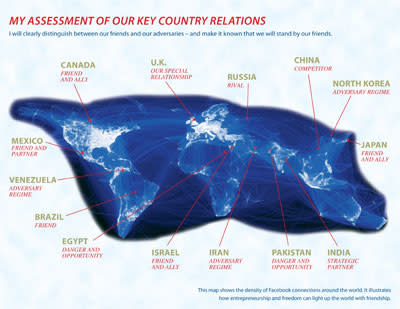 The Envoy
The EnvoyDoes Herman Cain think the Arab Spring is a bad thing?

Even as he acknowledged reassessing his presidential campaign amid allegations of a 13-year affair, Herman Cain set out his foreign policy vision Tuesday in a document and a speech in Michigan.
"Herman Cain's Vision for Foreign Policy & National Security" paper (.pdf) seemingly reveals that the candidate, or his national security advisers, are slightly out of touch with the events shaking the globe over the past year. At times, Cain appears to want to turn back the clock to the era when America worked closely with Arab strongmen--except when it decided one needed to be overthrown.
For example, the Cain foreign policy paper describes Yemen's ruler of three decades, Ali Abdullah Saleh, as "battling Iranian-backed rebels in the north and an Al Qaeda-backed secessionist movement in the south," before taking a swipe at President Barack Obama:
Taking the path of least resistance in the face of Al Qaeda-backed protestors, President Obama has insisted that Saleh step down. Mr. Cain recognizes this as a flawed policy - one that will strengthen the terrorists. Instead, we should be working with President Saleh and potential successors to engineer a soft-landing for this pro-U.S. partner.
Only one problem here: Saleh stepped down last week, at a ceremony in Saudi Arabia attended by American and Persian Gulf-allied diplomats, who have been pressing Saleh to step down for months.
Similarly, the Cain foreign paper's discussion of Egypt suggests the candidate would like to roll back the clock. Waxing nostalgic for simpler days, Cain comes out strongly against the so-called "Arab spring" pro-democracy uprisings that he says "shoved out" Egyptian strongman Hosni Mubarak.
"Under President Hosni Mubarak, Egypt was a friend," the Cain paper states. "With Mubarak shoved out by Arab Spring protests—with help from President Obama—Egypt could be a nightmare unfolding."
Correctly noting that Egypt's Islamist Muslim Brotherhood is "poised to pick up a sizable number of seats in Parliamentary elections," Cain suggests that the flaws of Mubarak's reign were outweighed by the strategic benefits, at least from Washington's perspective. Even if that is a legitimate analysis, Cain doesn't explain what he would do as president to restore that more favorable state of events. Would he try to restore Mubarak to office?
On Libya, Cain asserts the decision to oust Col. Moammar Gadhafi was not a morally or strategically simple matter.
"Mr. Cain sheds no tears for Colonel Gaddafi, who personally ordered the killing of Americans," the paper states. "However, the White House launched the war in Libya under the Obama Doctrine of the 'responsibility to protect.' The question now is: 'protect whom?' The Libyan rebellion-turned-government has been aided by Al Qaeda, and it is dominated by Islamists that have not been friendly to U.S. interests."
More broadly, Cain's vision divides the world largely into three sets of countries: friends and allies, strategic partners, and adversaries.
In the category of "friends and allies," Cain lists seven countries: Canada, Israel, Germany, Japan, Brazil, Mexico, and the United Kingdom (England gets the additional ranking of "special relationship").
Four countries--some in which the United States has had until recently tens of thousands of troops or is conducting drone strikes--are designated as "strategic partners": Afghanistan, Iraq, Yemen, and oddly, India.
Four more countries are dubbed "adversary regimes": Venezuela, Iran, Syria, and North Korea.
Cain bequeaths China its own ranking as a "competitor."
Pakistan and Egypt are each judged as presenting the United States a "danger and an opportunity."
The Cain paper tags the American relationship with Libya--the topic that flummoxed Cain in an interview with the Milwaukee Journal Sentinel--as requiring "more clarity."
France--a close American ally with which Obama has worked particularly closely on Iran, Libya, and Middle East peace as well as global economic rescue efforts--gets no mention in the document.
Nor does Turkey, a key Middle East and NATO ally with particular leverage in Syria, Iran and the Arab world.
Institutions like the United Nations, NATO, or the European Union are never mentioned.
Facebook, however, gets a nod. The Cain map of the world, displayed in the photo at the top of this page, indicates that it is drawn roughly based on "the density of Facebook connections around the world."
Other popular Yahoo! News stories:
• United Kingdom expels Iranian diplomats after embassy attack
• Newt Gingrich dominates Florida in new poll
• Newt Gingrich talks amnesty, drug laws and Social Security with Yahoo News
• DNC targets Romney as a flip-flopper
Want more of our best national security stories? Visit The Envoy or connect with us on Facebook and on Twitter. Want more politics? Visit The Ticket or connect with us on Facebook and follow us on Twitter.
